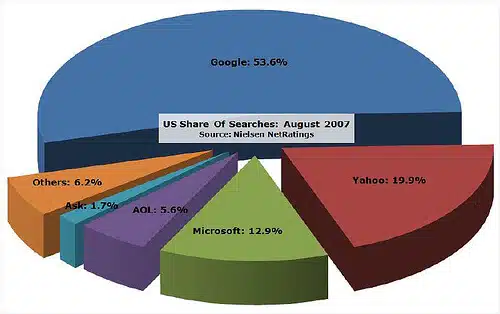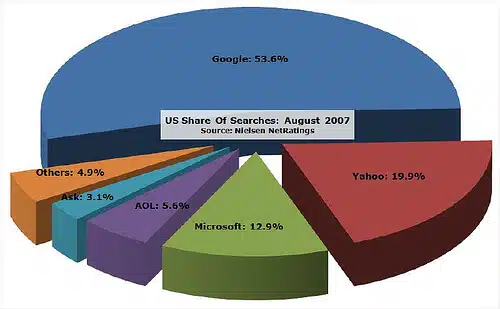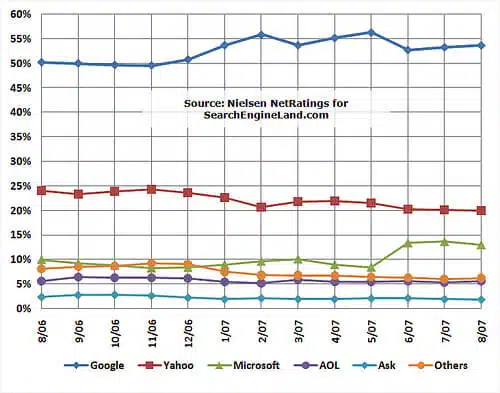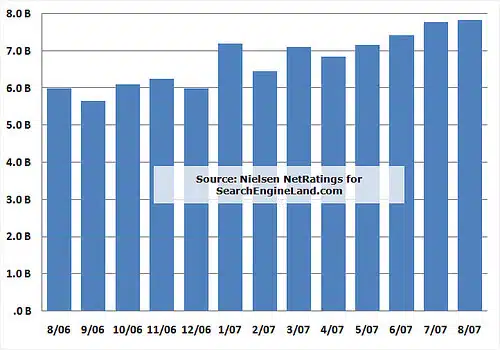Nielsen NetRatings: August 2007 Search Share Puts Google On Top, Microsoft Holding Gains
Continuing on with this month’s search popularity stats review, I’m turning now to those from Nielsen NetRatings, after having looked at Hitwise stats yesterday. Like yesterday’s stats, those from NetRatings are from August 2007. They show Google on top, Yahoo fairly steady and Microsoft largely holding on to gains made in June. You’ll find the […]
Continuing on with this month’s
search popularity stats review, I’m turning now to those from Nielsen NetRatings, after having looked at Hitwise stats yesterday. Like yesterday’s stats, those from NetRatings are from August 2007. They show Google on top, Yahoo fairly steady and Microsoft largely holding on to gains made in June.
You’ll find the press release here (PDF format), showing the top ten most popular services. Here’s the top five:
- Google: 53.6%
- Yahoo: 19.9%
- Microsoft: 12.9%
- AOL: 5.6%
- Ask: 1.7%
The figures above are the percentage of all US searches handled by leading search engines. Here’s the (hopefully) pretty pie chart:
One thing with the chart above is that while Microsoft gets to have its MSN and Live traffic combined, Ask doesn’t get to have the traffic it controls on My Web Search and My Way similarly consolidated. Since NetRatings lists those on the release, here’s how they would help Ask’s overall share of the pie:
Combined, they take Ask from a 1.7 percent share to a 3.1 percent share.
Popularity Trends: Search Share
How do things look over time? Here’s the trend chart:
Google is still well ahead of its competitors. It took some slight hits sharewise from June onward due to Microsoft coming up. Yahoo also took a hit. But as I’ll explain further below, neither actually lost any amount of raw searches. In fact, they gained — it’s just that Microsoft enlarged the overall search "pie" through its Live Search Club.
Trends: Number Of Searches
To understand how the pie has gotten bigger, consider this chart:
That’s the number of searches, in billions, estimated to have happened each month in the United States by NetRatings. In June 2007, there were 7.4 billion searches. By August 2007, there were 7.8 billion searches — 400 million more searches. This means that it’s possible that a search engine had a smaller share in August compared to June but still had more searches, since the overall pie was bigger.
Now consider this chart:
This shows the raw number of searches each service handled. On a share basis, Google had a high over the past year of 56.3 percent in May 2007 and has since dropped below that level. But in terms of number of searches, August was a record-breaker, over the past year.
Look back in January, and you’ll see Google had this huge spike in searches. NetRatings: Google Spike, Live.com Rise In February 2007 covers this in more detail and explains how NetRatings told me the rise wasn’t due to YouTube traffic suddenly being added to Google’s share or with the overall search "universe" adjustment that happened. I still have it on my list to try and get a better explanation, because a billion searches appearing out of the blue seems odd.
On a share basis, Yahoo looks to do a very slight drop — but in terms of number of searches, it has held rock steady.
Microsoft has a jump in both share and raw numbers. This is almost certainly due to the Live Search Club promotion they’ve run. These stories give more background on that:
- comScore Also Reports Microsoft Search Share Rise
- Microsoft On Search Gains & Live Search Club
- Compete: Microsoft Gaining Searches; Live Search Club Giveaway Working?
Caveat Time!
As a reminder, my general rules when evaluating popularity stats:
- Avoid drawing conclusions based on month-to-month comparisons. Lots of things can cause one month’s figures to be incomparable to another month. It’s better to see the trend across multiple months in a row.
- Avoid drawing conclusions based on one ratings service’s figures. Each service has a unique methodology used to create popularity estimates. This means that ratings will rarely be the same between services. However, a trend that you see reflected across two or more services may give you faith in trusting that trend.
- Consider Actual Number Of Searches: While share for a particular search engine might drop, the raw number of searches might still be going up (and thus they might be earning more money, despite a share drop). This is because the "pie" of searches keeps growing, so even a smaller slice of the pie might be more than a bigger slice in the past.
Contributing authors are invited to create content for Search Engine Land and are chosen for their expertise and contribution to the search community. Our contributors work under the oversight of the editorial staff and contributions are checked for quality and relevance to our readers. The opinions they express are their own.
Related stories
New on Search Engine Land




